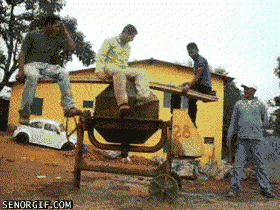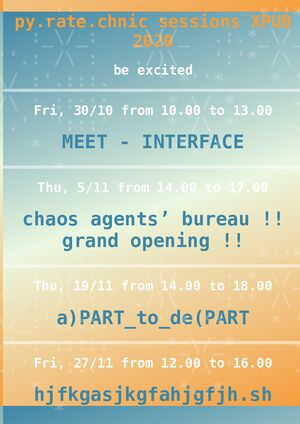Prototyping 2
Session 2019.09.23: map of interests and practice
Create a visual map that conveys your current topics of interest and practice (projects, experiments, prototypes)
Start your Hackpact
Session 2019.10.14
Review your Hackpact entries.
Plan the Py.rate.chnic_sessions
Py.rate.chnic_sessions dates


General description
Under the name of .py.rate.chnic sessions, the second-year students from the Experimental Publishing Master program invite you to participate in a series of hands-on workshops, related to the topics of their graduation projects. Each workshop offers the participants an opportunity to engage with the students' research by partaking in their processes, experiments, and discussions.
.py.rate.chnic sessions are a series of collective work-sessions organized by the XPUB second-year's students and attended by first-years.
Each sessions is conducted by two second-years who organize the session around a topic or format related to their graduation projects. The session will function as an opportunity to develop, experiment, test and discuss their processes collectively.
Timeline
We will meet each other on the following days:
Monday 21st of Sept
ONLINE
.py.rate.what?
10:00 - 12:00 warming up
12:00 - 13:00 break
13:00 - 14:30 format fantasies, duo-forming, planning
Hotline location: https://hotline.xpub.nl/py.rate.chnic
Pad of the day: https://pad.xpub.nl/p/py.rate.chnic
Tuesday 13th of Oct
IRL
11:00 - 13:00 Discuss idea/plans/directions + picking dates (20 min/group)
13:00 - 14:00 break
14:00 - 16:00 Py.rate.chnic announcement (collective poster making)
Hotline location: https://hotline.xpub.nl/py.rate.chnic
Pad of the day: https://pad.xpub.nl/p/py.rate.chnic-2020-gathering-2
Tuesday 27th of Oct
IRL
10:00 - 13:00 Preparations & Feedback
Hotline location: https://hotline.xpub.nl/py.rate.chnic
Tuesday 10th of Nov
IRL
10:00 - 13:00 Preparation & How did it go?
Hotline location: https://hotline.xpub.nl/py.rate.chnic
Pad of the day: https://pad.xpub.nl/p/py.rate.chnic-10-11-2020
Monday 23rd of Nov
ONLINE
10:00 - 13:00 Preparation / reflection
Hotline: https://hotline.xpub.nl/py.rate.chnic
Pad of the day: https://pad.xpub.nl/p/py.rate.chnic-23-11-2020
Sessions timeline
Session 1
Title: MEET - INTERFACE
Date: Friday 30 October (10:00 - 13:00)
Who: Avital & Max
Session 2
Title: chaos agent's bureau !!
Date: Thursday 5 November (14:00 - 17:00)
Who: anna, damla, clara
Session 3
Title: a)PART_to_de_(PART
Date: Thursday 19 November (14:00 - 18:00)
Who: ioana, mark, tisa
Session 4
Title: hjfkgasjkgfahjgfjh.sh
Date: Friday 27 November (12:00 - 16:00)
Who: Sandra & Mika
.py.rate.chnic planning document
To prepare the sessions we will work on a small planning document.
Making this document will be helpful for announcing the .py.rate.chnic sessions to XPUB1.
This document includes:
title: img: format: short description: what will happen? [one line!] why (relevance)? [one line!] outcome (what will be goal of the session)? [one line!] who (is organising the session): when: where: maximum amount of participants: preparations (what do participants need to prepare before joining the session?):
Formats
The format of a session can be anything!
A few examples:
- hack-a-thon: where you ask the participants to explore a subject, by making prototypes together (open-ended, technical, DIY)
- workshop: departing from a specific question / technology / prototype / ... inviting others to engage with it in a specific way (methodology, how-to, tools)
- (book) sprint: where the group writes collaboratively a manual / research text / book / and produce a website / pdf /... (collective practices, workflows, reading/writing)
- test session: where a given procedure / methods is tested on the participants and at the end feedback is given (feedback, testing the limits)
- ... or any other form of activation :--)
Preparations
These could include for example: a text, software installations, material to bring, ...
Using a preparation list is useful, as it will make it easier to start quickly, be a bit productive (installing things often eat up a lot of time!) and have more fun.
TIP: Do not overload the participants with too many preparations.

